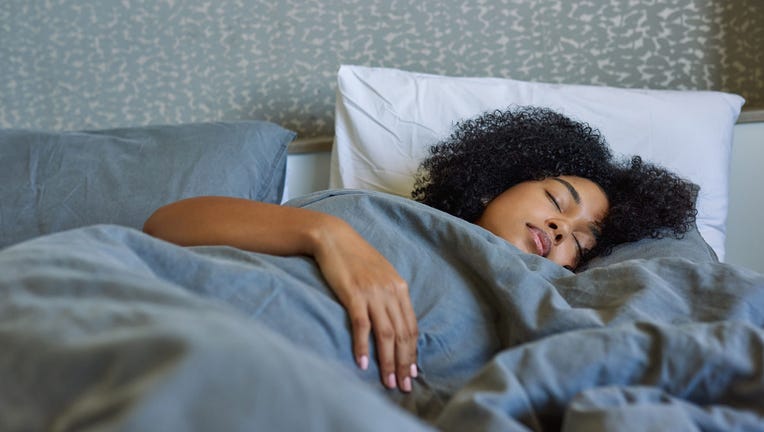‘Sleep divorce’: Why are some couples spending their nights in separate beds?

Woman sleeping alone in a bed. via Getty Images
For many couples, it seems "for better or for worse" does not include tossing and turning during the night.
A growing number of Americans are opting to leave the marital bed in exchange for a better night’s sleep elsewhere in the home — a scenario that some call a "sleep divorce."
More than a third of people say they "occasionally or consistently" sleep in a different room than their partner, according to a recent survey by the American Academy of Sleep Medicine (AASM) in Illinois.
PARTY OF ONE: WHY BRIDES ARE GOING ON SOLO BACHELORETTE TRIPS AHEAD OF THEIR WEDDING DAY
"We know that poor sleep can worsen your mood, and those who are sleep-deprived are more likely to argue with their partners," said Dr. Seema Khosla, pulmonologist and spokesperson for the AASM, in a press release announcing the findings.
"There may be some resentment toward the person causing the sleep disruption, which can negatively impact relationships."
"Getting a good night’s sleep is important for both health and happiness, so it’s no surprise that some couples choose to sleep apart for their overall well-being," she continued.
Men were more likely to sleep elsewhere, with 45% of them saying they do so "occasionally or consistently," compared to 25% of women.
HOW DO I STOP SNORING? NATURAL TREATMENTS COULD REDUCE THE SOUND
"Although the term ‘sleep divorce’ seems harsh, it really just means that people are prioritizing sleep and moving into a separate room at night when needed," said Khosla in the release.
"However, if it is one partner’s loud snoring that is leading to separate sleep spaces, then you should encourage that partner to talk to a doctor about obstructive sleep apnea," she said.
There is a common perception that if couples are sleeping in separate beds or rooms, their relationships must be on the rocks, noted Dr. Brandy Smith, a licensed psychologist with the virtual health care company Thriveworks — but that’s not always the case, she said.
"While it’s true that sometimes it’s indicative of a problem, it is not always a red flag," Virginia-based Smith, who specializes in relationships and couples counseling, told Fox News Digital.
BIDEN HAS SLEEP APNEA: WHAT IS IT?
The most common reasons she's heard from patients are snoring, frequent movements that keep one partner awake or wake them too often throughout the sleep cycle, mismatched sleep/wake cycles and schedule differences, said Smith.
One woman on Reddit described how sleeping apart has worked for her marriage.
"My husband and I have been married for 20 years. We have a great relationship. The last five years, we have had our own bedrooms," she wrote.
"He likes to sleep with the TV on all night and a bright nightlight and a warm room. I like total darkness and total quiet and about 5 degrees cooler. We each just get better sleep on our own."
DANGERS YOU CAN'T SEE MAY BE LURKING IN YOUR UNWASHED BEDDING: BEWARE THE ‘HEALTH CONCERNS'
Another Reddit user claimed that without separate bedrooms, their relationship would have ended a long time ago.
"We are just not sleep compatible," the user wrote. "Be it different schedules, my snoring … my desire for white noise, etc."
The person added, "When one or both partners are not getting proper sleep and blame the other one, that can tear relationships apart. It just slowly builds resentment."
One man, however, shared that his "sleep divorce" started about a year prior to the real divorce from his ex-wife.
"Turns out, the further away you sleep from someone you just can't stand anymore, the better your sleep is," he wrote.
For couples who would rather not sleep apart, Smith said there are other options to ensure healthy sleep.
"Given the concerns I have heard, options to consider have usually fallen into one of two categories," she said.
"One is a health consultation to see if any medical treatments can reduce snoring or bodily movements, or the couple might explore schedule changes so that sleep/wake schedules overlap more."

